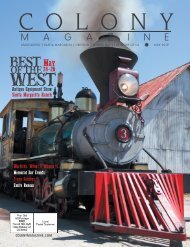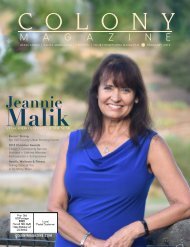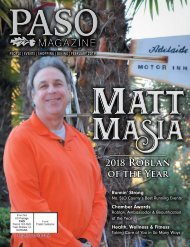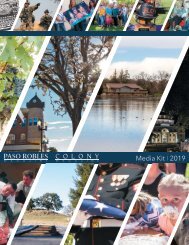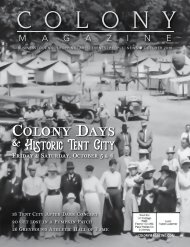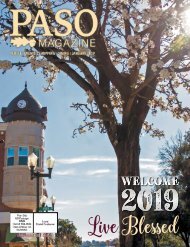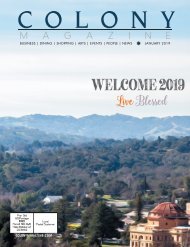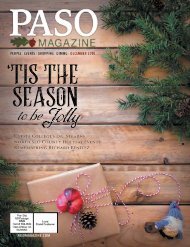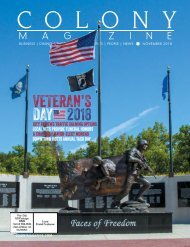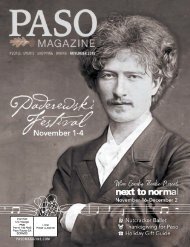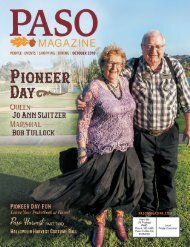2018 September COLONY Magazine
COLONY Magazine — Your Hometown Magazine. A collection of events, activities, news, business, and culture for the Atascadero area.
COLONY Magazine — Your Hometown Magazine. A collection of events, activities, news, business, and culture for the Atascadero area.
You also want an ePaper? Increase the reach of your titles
YUMPU automatically turns print PDFs into web optimized ePapers that Google loves.
<strong>COLONY</strong> PEOPLE<br />
Welcome back, Conrad<br />
Photos by Pat Pemberton<br />
AHS grad Nate Conrad Enters 13th Year Leading His Old Band<br />
Nate Conrad was preparing to fly to Europe<br />
where he would perform for the<br />
third time since entering college when<br />
the call came to go back home.<br />
“Four or five people from Atascadero called<br />
me and said, ‘When are you going to get<br />
your teaching credential?’” said Conrad, who<br />
was studying at California State University,<br />
East Bay at the time. “Because the job just<br />
opened up.”<br />
The Job: director of the high school band.<br />
Seven years earlier, Conrad had performed<br />
with that band as a student. Suddenly, he<br />
had an opportunity to return to Atascadero<br />
as an educator.<br />
Remember that 70s sitcom “Welcome<br />
Back, Kotter?”<br />
Like that, but without a laugh track.<br />
Now, 12 years after his return, Conrad is still<br />
leading that band, which will experience a significant<br />
change this year when it skips marching<br />
competitions to focus on musicianship and<br />
local events.<br />
“This is pretty awesome,” he said, sitting in<br />
a temporary instrument storage space while<br />
the band room undergoes renovation. “And<br />
I’m really happy doing what I’m doing where<br />
I’m doing it.”<br />
Conrad moved to Atascadero at the age of<br />
four with a family of musicians.<br />
“We were always singing and making music<br />
in the house growing up,” he said.<br />
His father, an Episcopal priest, enjoyed classical<br />
music and hymns, so that dominated —<br />
but didn’t necessarily dictate Conrad’s earliest<br />
music selections.<br />
“I got the first Weezer album and the first<br />
Green Day album,” he said.<br />
But during his sophomore year, his parents<br />
bought him some music for Christmas —<br />
Count Basie and J.J. Johnson — and he was<br />
hooked on jazz.<br />
“It probably took me twice as long to do<br />
my homework as any other student,” he said.<br />
“Because I had those CDs on all the time, and<br />
I would space out and listen to music.”<br />
Conrad began playing trombone one day<br />
simply because the other available instruments<br />
— a trumpet and a clarinet — were in worse<br />
condition.<br />
“In a typical musician way, I love that it’s<br />
impossibly hard to play,” he said of the trombone.<br />
“My youngest brother is a professional<br />
saxophone player, and every time I see him<br />
play, I’m like, man — that’s such a smarter<br />
way to go.”<br />
After high school, Conrad started his studies<br />
at Cuesta College, had a brief stop at Cal Poly,<br />
then headed to Hayward, where he found more<br />
opportunities to perform and compose. He<br />
would have continued to perform in the Bay<br />
Area had he not returned to that familiar place.<br />
By Pat Pemberton<br />
“It was familiar in a really good sense,”<br />
he said. “The weird part was talking to<br />
the teachers.”<br />
A few of the teachers he’d distanced himself<br />
from as a student suddenly appeared<br />
much differently once he got to know them<br />
as colleagues.<br />
“It turns out they were phenomenal people,”<br />
he said with a laugh.<br />
While competing has long been an element<br />
of the marching band, this year, Conrad and<br />
the administration decided to back off from<br />
competition.<br />
For one thing, Conrad said, the school always<br />
had to travel long distances to compete<br />
against much bigger schools. And competing<br />
on the road, he added, just isn’t as rewarding<br />
as performing at community events or home<br />
football games.<br />
“When the stands are full, it’s close to<br />
2,000 people,” he said. “So over the course of<br />
five home games, we’re playing for close to<br />
10,000 people.”<br />
By skipping competitions, he said, he can focus<br />
on making students better musicians, which<br />
will ultimately help those who want to pursue<br />
music further.<br />
And serious musicians will want to play serious<br />
music, which is why this year’s catalog<br />
includes several Steely Dan numbers.<br />
“A lot of them don’t know Steely Dan,” Conrad<br />
said. “But by the end of the year, they’re<br />
going to be checking out Steely Dan and other<br />
bands from that era and similar styles, so<br />
that’s a win.”<br />
16 | colonymagazine.com <strong>COLONY</strong> <strong>Magazine</strong>, <strong>September</strong> <strong>2018</strong>






